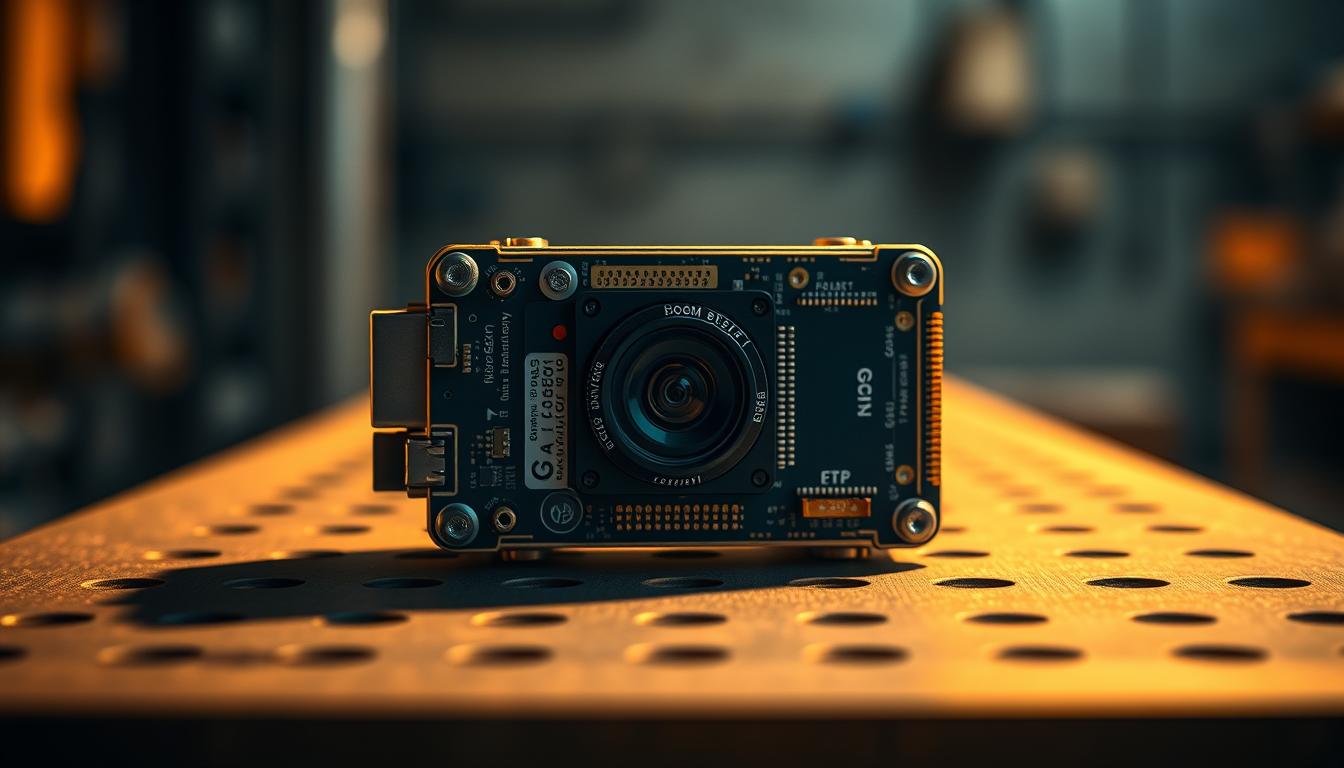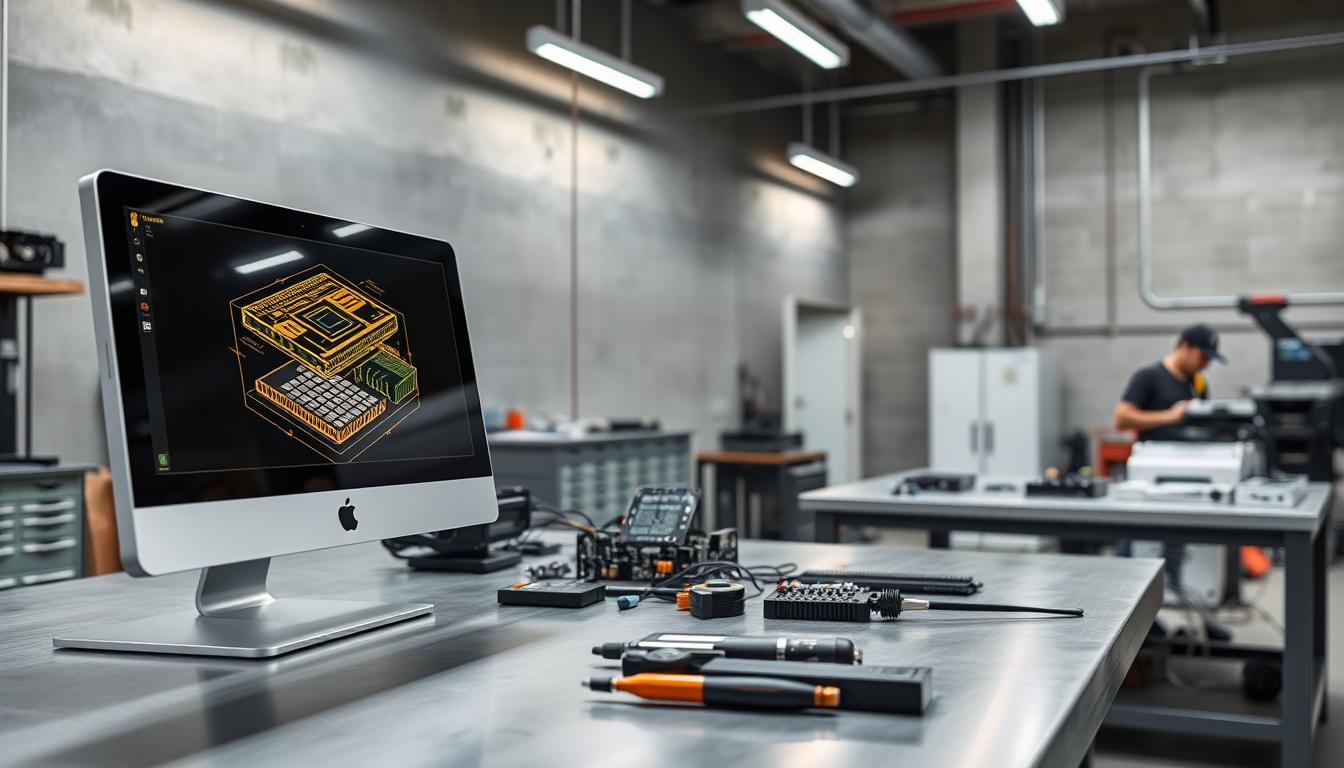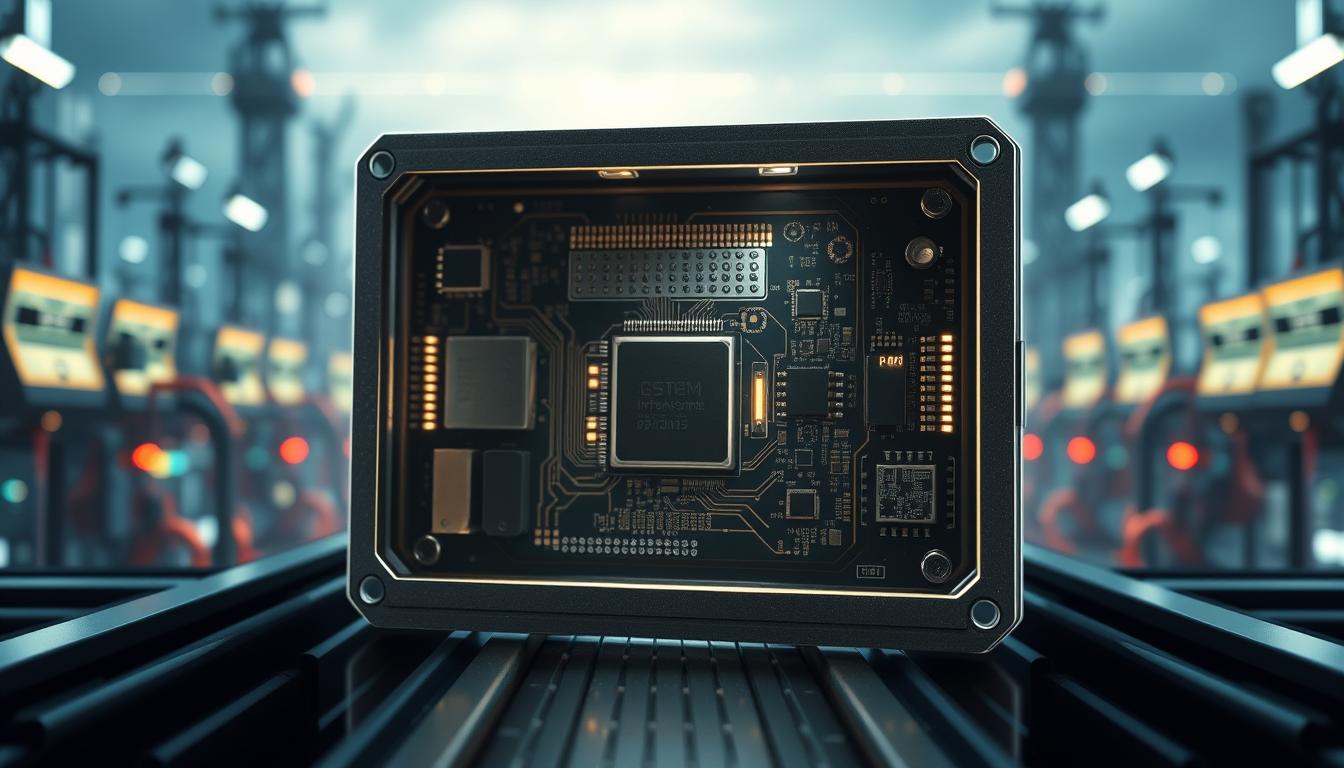Discover System on Module for industrial IoT
Modern industry is undergoing a major transformation with the advent of the System on Module (SoM). This compact, modular system is revolutionizing industrial IoT. Syscom-Prorep, with 30 years' experience in industrial electronics, offers innovative SoMs. They meet the challenges of automation in an efficient way.
The role of SoM in the evolution of Industry 4.0 is crucial. It combines artificial intelligence, industrial IoT and 5G to optimize production. These advanced technologies, combined with SoM, mark the beginning of an era of unprecedented efficiency and connectivity in industry.
Advantech's WISE modules demonstrate the benefits of SoM. They facilitate communication between sensors and machines via Modbus TCP. They support the REST protocol and integrate MQTT for enhanced IoT security. These systems offer remarkable flexibility, working with various browsers and cloud platforms such as Azure and AWS.
Key points to remember
- SoM revolutionizes industrial IoT with compact, powerful solutions
- Syscom-Prorep brings 30 years of expertise in industrial electronic solutions
- AI, IIoT and 5G boost adoption of systems on modules
- WISE modules offer advanced connectivity and extensive compatibility
- SoM facilitates the integration of new technologies in Industry 4.0
The evolution of IoT technologies in modern industry
Modern industry is going through a period of accelerated transformation, thanks to advances in IoT technologies. SOM boards and single-board computers are at the heart of this evolution. They offer compact, high-performance solutions for industrial automation.
Megatrends in industrial automation
Today's programmable controllers incorporate advanced IoT functionalities. The Eaton easyE4 and Siemens LOGO! 8.3 models stand out for their cloud connectivity and remote monitoring capabilities. Siemens SIMATIC S7-1500s stand out for their performance and scalability. As for the Crouzet Millennium Slim, they stand out for their compactness and customizability.
The impact of 5G and AI on industrial IoT
5G is transforming industrial communications. 4G/NB-IoT modules offer better bandwidth and efficiency than their 2G/3G predecessors. NB-IoT, in particular, stands out for its low power consumption and wide coverage, ideal for applications such as smart greenhouses.
The role of edge computing in Industry 4.0
On-site processing is becoming essential in Industry 4.0. Single-board computers enable remote control of HVAC and irrigation equipment, improving the management of industrial facilities. This edge computing approach, combined with SOM boards, offers the flexibility and responsiveness essential for AI inference in modern industrial applications.
Understanding System on Module and its applications
The System on Module (SoM) is transforming the way industrial electronic systems are designed. It represents a compact, high-performance solution for industrial IoT.
Definition and essential components
An SoM is a small embedded computer, specially designed for embedded applications. It combines the flexibility of a CPU with the processing power of an FPGA. Key components include advanced processing units such as NPUs, VPUs and DSPs. These units are designed to support AI frameworks such as TensorFlow Lite and PyTorch.
Benefits for IoT integration
SoM brings major advantages for IoT integration in industrial electronics:
- Reduce design cycles and costs
- Easy integration thanks to their ready-to-use nature
- Personalization through the development of a simple carrier card
- Increased reliability over extreme temperature ranges (-40°C to +85°C)
Available module types
SoMs are available in various configurations to meet the specific needs of system design:
- FPGA-based modules from manufacturers such as Intel® and AMD
- Options with high-speed transceivers
- Memory varieties (DDR3, DDR4, QDR2+)
- Multiple interfaces: USB, Gigabit Ethernet, HDMI, FMC connectors
These versatile modules are suitable for a wide range of applications. They range from IoT gateways to multimedia and AI processing. They accelerate the development of innovative industrial electronics solutions.
Industrial SoM architecture and functions
Industrial System-on-Modules (SoMs) mark a significant milestone in the evolution of embedded computing. These compact modules combine multi-core processors, RAM memory, storage and interfaces such as USB and Ethernet. This structure offers significant flexibility compared with System on Chip, facilitating integration with a variety of support boards.
In the fields of industrial automation, medical devices and the Internet of Things, SoMs are proving essential. They incorporate technological advances such as artificial intelligence and support for advanced communication protocols, such as Wi-Fi 6 and 5G. Security is a priority, with features such as secure boot, OTA updates, and encrypted storage.
Robustness is at the heart of industrial SoM design. Designed for continuous operation, they withstand extreme environmental conditions from -40 to +85°C. Their service life of up to 10 years makes them an ideal choice for long-term projects. Manufacturers often offer an industry-exclusive 3-year warranty.
Scalability is a major advantage of SoMs. Thanks to customizable carrier boards, manufacturers can easily adapt them to their specific needs. This flexibility, combined with comprehensive development tools and ongoing support, positions SoMs as a leading solution for Industry 4.0.
Connectivity solutions for industrial IoT
Industrial IoT is radically transforming production processes. Advanced connectivity solutions play an essential role. Modular systems, in particular, offer a wide range of secure communication options.
Supported communication protocols
Embedded systems for industrial IoT support a variety of protocols:
- LoRaWAN: Ideal for long-range applications
- NB-IoT: Suitable for limited data needs with good coverage
- 4G LTE: Offers a variety of data rates depending on the category (Cat 1, M1, Cat 4)
- Bluetooth and Wi-Fi: For local connectivity
Integration with existing systems
Module-based systems can be easily integrated into industrial infrastructures. They are compatible with Modbus/TCP, MQTT and REST API protocols. This facilitates connection to ERP, SCADA and MES systems. This flexibility means that equipment can be modernized without needing to be completely replaced.
Data and network security
Security is paramount in industrial IoT. Embedded systems integrate robust encryption and authentication functionalities. The use of eSIM technology and RSP platforms enhances resilience. This enables automatic switching to backup connectivity providers.
These advanced connectivity solutions, combined with the optimized power management of on-module systems, promise to reduce the total cost of industrial IoT solutions by over 30%.
Practical applications in the industrial environment
SOM cards and single-board computers are transforming today's industry. They provide advanced solutions for processing data directly on site. This increases operational efficiency in many areas.
In the quality control sector, machine vision systems, based on SOM boards, ensure automated, high-precision inspection. On production lines, these devices analyze products in real time. They detect imperfections that escape the naked eye.
Single-board computers facilitate on-site processing, improving the speed of industrial processes. IoT sensor data is processed instantly. This enables immediate decision-making. This reduces downtime and optimizes production.
Predictive maintenance applications use SOM cards to monitor the condition of equipment. By analyzing vibration, temperature and other parameters, these systems predict future breakdowns. They extend machine life and reduce maintenance costs.
In the field of training, units such as APC or FLPTU, equipped with SOM boards, enable students to learn the basics of industrial process control. These platforms simulate real-life environments. They effectively prepare the future workforce for the challenges of Industry 4.0.
Optimizing production processes with SoM
Systems on Modules (SoM) are transforming industrial electronics, offering advanced solutions for optimizing production. These integrated hardware solutions enable real-time monitoring, predictive maintenance and improved quality management. They are essential for improving efficiency and precision in industrial processes.
Real-time monitoring
SoM-based system design enables real-time data collection and analysis. This capability facilitates informed decision-making and the rapid identification of bottlenecks in production. Integration with IoT devices offers comprehensive process monitoring, enabling optimal management.
Predictive maintenance
SoMs play a crucial role in predictive maintenance. By analyzing equipment data, they help anticipate potential breakdowns. This proactive approach reduces downtime and extends machine life, optimizing production efficiency.
Quality management
SoM's integrated hardware platform significantly enhances quality control. It enables continuous parameter checks and rapid anomaly detection. The use of 3-axis robots, integrated via SoMs, increases precision in gluing and assembly processes.
Optimization via SoM extends to resource management, reducing waste and maximizing the use of materials. Modular user interfaces facilitate adaptation to different applications, promising greater flexibility in industrial production.
Performance and reliability of embedded systems
Embedded computing is fundamental to modern industry. It combines high computing power with low energy consumption. This synergy is vital for the most demanding industrial applications.
Emerging technologies, integrated into electronic modules, dramatically improve performance. Multi-core processors and AI gas pedals make it possible to handle complex tasks with speed. FPGAs, for example, are used for intensive parallel computing. STM32 and ESP32 microcontrollers, meanwhile, offer peripheral-rich integration.
Reliability is essential in industrial environments. Research is aimed at improving the reliability of embedded electronic components. These include:
- Controlling reliability right from the design stage
- Industrial process integration
- Quantifying reliability through ageing studies
- Analysis of precipitated failures
Innovative projects such as MeGan and ACCEA aim to improve performance while reducing costs. These advances in embedded computing help optimize industrial processes. They strengthen the competitiveness of companies.
Integrating machine vision solutions
Systems on modules (SoM) are transforming machine vision. They offer advanced capabilities for image processing and quality control. These embedded systems are essential to industry.
On-board image processing
Modern SoMs offer advanced functionalities for machine vision:
- Support for up to 8 cameras via two CSI interfaces
- Integrated image processor for pre-processing
- Two C7 DSP units for signal processing and AI
- 50 GFlops graphics performance
These features enable fast, precise image processing directly on the module-based system. This eliminates the need for external units.

Quality control applications
Embedded systems for machine vision comprise several key modules:
- Optical imaging module for lighting and guidance
- Image sensor for photoelectric conversion
- Processing module with DSP, ARM or FPGA
- IO interfaces for results communication
These components enable highly accurate automated visual inspections. SoM components can withstand temperatures ranging from -40°C to +85°C. This ensures their reliability in a wide range of industrial environments.
Thermal and energy management solutions
SOM boards and single-board computers are essential for the energy optimization of industrial systems. They incorporate advanced technologies to manage heat and energy consumption efficiently.
Optimizing consumption
Designed to maximize energy efficiency, SOM boards use low-power processors. They feature intelligent standby modes to reduce power consumption. On-site processing reduces energy consumption by limiting data transfers to the cloud.
Cooling systems
Thermal management is crucial for single-board computers in industrial environments. Two main methods are used:
- Liquid cooling: highly efficient for intensive applications
- Air cooling: a simple, economical solution for less demanding applications
Manufacturers are developing innovative solutions, such as the use of high-performance polymers and thermal adhesives. These technologies improve heat transfer and temperature control on SOM boards.
Optimum thermal management increases component performance and service life. Poorly controlled temperature fluctuations can reduce lifetime by over 50%. Modern solutions take into account internal dissipation and external environmental factors for precise control.
Design and development of customized solutions
The design of customized systems for industrial electronics is based on integrated hardware platforms. These solutions offer remarkable flexibility to meet the specific needs of each sector. The System on Module (SoM) market is growing at an annual rate of 8.4% until 2031. This underlines the growing demand for customized IoT solutions.
SoMs play a crucial role in industrial automation, IoT devices and robotics. Their adoption shows their importance in the development of customized industrial applications. Miniaturization and high performance are at the heart of these innovative computing platforms.

- Development of electronic components and software services for a complete IoT solution
- Creating custom operating systems with Yocto, Embedded Linux or WrLinux
- Integration of remote control tools and over-the-air updates
- Setting up cloud synchronization for data transfer between instruments and databases
The integration of AI and machine learning into SoMs enhances their processing power. This evolution makes them particularly suitable for customized industrial and IoT applications. Demand for compact, energy-efficient and scalable solutions is driving the development of customized SoMs for various industrial sectors.
Conclusion
The evolution of embedded computing and the emergence of new technologies are revolutionizing industry. System on Modules (SoM) are proving essential for industrial IoT. They offer unprecedented flexibility and efficiency.
Integrating pre-integrated modules, these solutions accelerate product development. They reduce costs and simplify system complexity. SoMs enable companies to be more agile in the face of technological challenges. They also pave the way for future innovations, notably in AI and edge computing.
Syscom-Prorep, with its 30 years of expertise, guides manufacturers in the integration of these technologies. Adopting SoM represents a strategic choice for staying competitive in the Industry 4.0 era. It improves operational efficiency and strengthens companies' innovative brand image.
FAQ
What is a System on Module (SoM) and how is it used in industrial IoT?
A System on Module (SoM) is an integrated hardware platform. It combines the essential components of a computer on a single board. In industrial IoT, SoMs enable the creation of compact, high-performance solutions. They are modular, offering great flexibility for diverse industrial applications.
What are the advantages of using SoM in industry?
SoMs offer several major advantages in the industry. They are flexible and quick to implement. Thanks to customizable carrier boards, they can be easily adapted to specific needs. They are also efficient in terms of performance and energy consumption. What's more, they simplify IoT integration and modernize existing infrastructures.
How can SoM contribute to edge computing in Industry 4.0?
SoMs are essential for edge computing. They enable data to be processed on site. This improves the efficiency and responsiveness of industrial systems. Reduced latency and faster decision-making are crucial for Industry 4.0.
What types of communication protocols are supported by industrial SoMs?
Industrial SoMs support a variety of communication protocols. They include LoRa, GNSS, Wi-Fi and Bluetooth. This diversity ensures great adaptability to the varied requirements of industrial applications.
How can SoM improve predictive maintenance in industry?
SoM enhances predictive maintenance by enabling real-time monitoring. They analyze on-site data, detect anomalies and predict breakdowns. This reduces downtime and optimizes maintenance.
How important is thermal management in industrial SoM?
Thermal management is crucial for industrial SoMs. It ensures their performance and reliability in harsh environments. Advanced techniques and innovative cooling systems ensure optimal operation.
How do SoMs facilitate the integration of machine vision solutions?
SoMs facilitate the integration of machine vision solutions. They offer high levels of on-board image processing power. This enables real-time visual analysis and advanced image processing directly on the module.
What are the security challenges associated with the use of SoM in industrial IoT?
Major security challenges include protecting sensitive data and securing network communications. Robust security measures are crucial. This protects the integrity of SoM-based systems in the industrial IoT environment.

